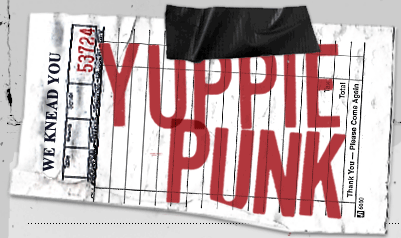Q&A: Sacha Gervasi, Director of ‘Anvil: The Story of Anvil’

Sacha Gervasi is, like, totally pumped to talk about the documentary he directed that follows an obscure Canadian metal band called Anvil. We can hardly finish firing off our first question before the British-born director, whose eclectic bio includes penning the script for Spielberg’s “The Terminal” and being Ginger Spice’s baby daddy, jumps in enthusiastically to answer, talking a mile-a-minute with incredible passion, the same way a lifetime Yankees fan might talk about his beloved baseball team.
And with good reason. Gervasi’s film, “Anvil!: The Story of Anvil” has been scoring rave reviews from critics and metal fans alike, earning comparisons to both the fictional film it pays tribute to (“This Is Spinal Tap”) and the seminal rock docs it aspires to be (“Gimme Shelter”). No small praise for a first-time documentary director and a band no one has cared about for two decades.
Gervasi is also stoked because great things are happening for the band, a band he ran away from home to roadie for as a rebellious teen. “Whitesnake and Judas Priest have just confirmed dates with Anvil on a huge tour this summer,” he shares enthusiastically via phone amidst a grueling press tour. “I think people are rallying to the call of Anvil, which is always satisfying. It just keeps being a surprise because this is just like a movie I made about my friends.” To get the scoop on the film, we sat down with the director to talk movies, metal and the relationship between the band’s founders, Steve “Lips” Kudlow and drummer Robb Reiner.
You have a very interesting bio. Not many people can lay claim to having penned a film for Spielberg, having babies with pop stars and being the Pete Best of Bush. And now you’re going to add documentary director to that list.
My life has tended to be pretty surreal ever since I was a little kid. I grew up in quite a surreal atmosphere. My parents started the anti-Vietnam war movement in the U.K. And my father taught economics at Oxford. He was a radical. He went on hunger strikes. So I grew up in a very unusual atmosphere and I guess my life has always been just a little bit crazy. I’ve had quite a few lives already.
 You were a roadie for Anvil in your teens, but what was it that sparked the idea to make a film about them so many years later?
You were a roadie for Anvil in your teens, but what was it that sparked the idea to make a film about them so many years later?
Well I’d sort of run away from home and gone on the road with these guys when I was a kid. And then in the summer of 2005, 20 years after I’d last seen them, I suddenly realized that they’d never stopped. Lips flew out to L.A. and we met again and it was as if no time had passed. That weekend I took him to see a buddy of mine and I just said, “They never stopped — it’s amazing. And they still believe they’re going to make it.” I was just so awed and shocked by their absolute refusal to give up that I thought, “This is like a real ‘Rocky’ story.” It’s like “Rocky” with Marshall amplifiers as Michael Moore liked to put it. And I think it is. It’s really a story of survival and endurance. I was actually on my way to making another movie and I just scrapped all my plans and realized I had to go and follow them on this tour that was staring to be booked. It was one of those natural organic things that I had to do.
What about financing the film? How did you pay for it?
I paid for it myself actually. I think the reality is I just didn’t have time to go around and say, “Hey, I’ve got this great story and I used to be into heavy metal.” People would have thrown me out of the film studios because it’s a movie that just needed to be made, not talked about. I was afraid I was never going to be able to convey what I felt it was going to be, largely because at that time I didn’t know what it was going to be. When you get involved with a documentary, you open the door and hope that it all falls together. I had a strong instinct, I had an amazing producer called Rebecca Yeldham, and an amazing cameraman, and we were a great team. I just felt like if we shot everything we’d be able to figure it out. And we did. And I’m really proud of the film.
Did you think there was a chance you’d come back from that tour with nothing?
We shot 320 hours of footage and there’s definitely a lot within that which is unusable or boring or repetitive, but I knew that because they were such extraordinary people and characters on this last chance power drive, going for it one last time, which was something beautiful and majestic and crazy and inspiring. I just knew that whatever happened, it would be great. You meet Lips and you just think, “My god, this guy’s a star.” And maybe not in the way that he understands, but he’s a star. It’s really weird, when Slash played with them at Sundance, as he was about to go onstage and jam with them, he turned to me and said, “Oh my god, I’ve got goosebumps. I’m about to go play with Lips!” When Slash is nervous about meeting him you know he’s got some sort of charisma.
Well it seems like so much of the movie is based around the band’s relationship to one another.
Yeah, it’s like the ultimate metal bromance. It’s really a love story between men, hopefully with no sex.
Do they understand that the film portrays them as these sort of metal caricatures? It seems like a fine line between laughing with them and mocking them.
I think that the film amplifies things and blows things up. If you meet them, they’re very surreal, larger than life characters. They’re naturally cinematic. They’re naturally very extreme and bombastic, in large part due to the insane commitment they’ve made to something that 99 percent of the world would consider crazy. But you know I always pitched this movie as “Spinal Tap” meets “Fitzgcarroldo.” They have a mission. They’re going to build this opera house in the middle of the jungle no matter what. In this case they’re going to become heavy metal stars. When people are passionate and dedicated to that degree and most of the world doesn’t see it, they naturally evolved into quite extreme characters. So I think I captured how they are. And I think even they would tell you that.
And they trusted that it wasn’t going to be mean-spirited?
I said to them, “You guys are fucking hilarious. You’ve got to understand that we’re going to be compared to Spinal Tap anyway. Your name is Robb Reiner.” It was unavoidable, so we just decided to embrace it. And I was really honest. I said, “People will start off thinking you guys are fucking nuts and by the end they’re going to be rooting for you and in tears.” And that’s exactly what happened. I explained the journey of the film to them in some detail. For god sakes, Lips’ favorite movie is “Spinal Tap.” They have a degree of self-knowledge. The point is, the movie is what it is because I was honest with them and they trusted me because they knew me when I was 15-years old. And they knew that the ultimate destination would be a good one. And look what’s happened to Anvil. A year ago they were playing to 20 people in a bar and now they’re going to be playing 10,000 seat arenas this summer.

And what about this as a rock doc or a metal film, were you conscious of wanting to make sure…
I think I was conscious of wanting to confound the stereotype of long hair, leather jackets and heavy metal. Because what this does is it just takes the stereotype and turns it on its head and says, “Hold on, these are real people with real families and they’re just like you and me.” I think its so easy to just put people in a box and judge them so easily. But if you really scratch the surface, you really might discover they’re not that different, and that’s the case here. I wanted almost to play with the stereotype and that’s why we chose “Spinal Tap” as a way to kind of riff on it. But by the end I think the film is much closer to something like “Hoop Dreams” or “Terms of Endearment” as someone said. It’s a powerful, emotional film about sustaining your dream against ridiculous odds over 35 years.
Have you heard from the other Rob Reiner or any of the Spinal Tap guys?
Yeah, they know about it. They’d been hearing about it, and someone saw it in Toronto a few days ago and said to them, “You should see the Anvil movie because people want you to tour together.” And I think it was Michael McKean who said, “Yeah, it’d be a toss-up as to who’d headline that one.” So they’re fully aware and I think Rob Reiner finds the whole thing delightful.
Who are some of your favorite documentarians?
I love the Maysles brothers obviously — they’re incredible. I love what Ondi Timoner did with “Dig!” and “We Live in Public.” I love Jarecki, and “Capturing the Friedmans” is one of my favorite docs. And Chris Smith and “American Movie” was a huge reference point for us. “Gimme Shelter” — I mentioned the Maysles earlier — is one of my favorite films. I love “Gimme Shelter.”
Do you suspect there will be more documentaries in your future?
I don’t know. This just was a really good story that just happened to be a documentary. But sure, if it’s a good story I’ll be totally up for doing it.
And does being a writer make you a good documentary director?
I think it made a big difference in terms of sorting out the story. Just like in a script, we carded the whole movie. We sat with the editors and we put all the pieces together and tried to make it work. So absolutely, I think it makes a huge difference. It needed to work as a film as much as a documentary if that makes sense.
“Anvil! The Story of Anvil” is opening slowly across the country. Check out the official website for the latest on when and where it’s playing.
RELATED: Q&A: Jeff Krulik, Director of ‘Heavy Metal Parking Lot’ | Top 10 Underrated Glam Metal Bands






